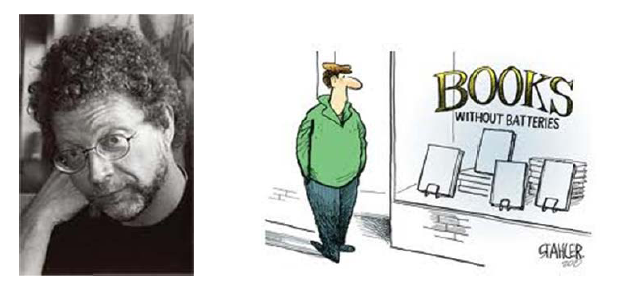Sven Birkerts discusses the fate of reading in the electronic age. Birkerts laments the fading popularity of books amidst the rise of technology that is reinventing the way that people read and learn.

…Over the past few decades, in the blink of the eye of history, our culture has begun to go through what promises to be a total metamorphosis. The influx of electronic communications and information processing technologies, abetted by the steady improvement of the microprocessor, has rapidly brought on a condition of critical mass. Suddenly it feels like everything is poised for change; the slower world that many of us grew up with dwindles in the rearview mirror. The stable hierarchies of the printed page-one of the defining norms of that world-are being superseded by the rush of impulses through freshly minted circuits. The displacement of the page by the screen is not yet total (as evidenced by the book you are holding)-it may never be total-but the large-scale tendency in that direction has to be obvious to anyone who looks. The shift is, of course, only part of a larger transformation that embraces whole economies and affects people at every level. But, living as we do in the midst of innumerable affiliated webs, we can say that changes in the immediate sphere of print refer outward to the totality; they map on a smaller scale the riot of societal forces. …
Only part of this great change impinges directly upon the literary enterprise. But the overall rescripting of all societal premises is bound to affect reading and writing immensely. The formerly stable system—the axis with writer at one end, editor, publisher, and bookseller in the middle, and reader at the other end—is slowly being bent into a pretzel. What the writer writes, how he writes and gets edited, printed, and sold, and then read—all of the old assumptions are under siege. And these are just the outward manifestations. Still deeper shifts are taking place [6] in the subjective realm. As the printed book, and the ways of the book—of writing and reading—are modified, as electronic communications assert dominance, the “feel” of literary engagement is altered. Reading and writing come to mean differently; they acquire new significations. As the world hurtles on toward its mysterious rendezvous, the old act of slowly reading a serious book becomes an elegiac exercise. …
Our era has seen an escalation of the rate of change so drastic that all possibilities of evolutionary accommodation have been short-circuited. The advent of the computer and the astonishing sophistication achieved by our electronic communications media have together turned a range of isolated changes into something systemic. The way that people experience the world has altered more in the last fifty years than in the many centuries preceding ours. …We have created the technology that not only enables us to change our basic nature, but that is making such change all but inevitable. This is why I take reading—reading construed broadly—as my subject. Reading, for me, is one activity that inscribes the limit of the old conception of the individual and his relation to the world. It is precisely where reading leaves off, where it is supplanted by other modes of processing and transmitting experience, that the new dispensation can be said to begin. …
My core fear is that we are, as a culture, as a species, becoming shallower; that we have turned from depth-from the Judeo-Christian premise of unfathomable mystery-and are adapting ourselves to the ersatz security of a vast lateral connectedness. That we are giving up on wisdom, the struggle for which has for millennia been central to the very idea of culture, and that we are pledging instead to a faith in the web. What is our idea, our ideal, of wisdom these days? Who represents it? Who even invokes it? Our postmodern culture is a vast fabric of competing isms; we are leaderless and subject to the terrors, masked as the freedoms, of an absolute relativism. It would be wrong to lay all the blame at the feet of technology, but more wrong to ignore the great transformative impact of new technological systems-to act as if it’s all just business as usual.
The devil no longer moves about on cloven hooves, reeking of brimstone. He is an affable, efficient fellow. He claims to want to help us all along to a brighter, easier future, and his sales pitch is very smooth. I was, as the old song goes, almost persuaded. I saw what it could be like, our toil and misery replaced by a vivid, pleasant dream. Fingers tap keys, oceans of fact and sensation get downloaded, are dissolved through the nervous system. Bottomless wells of data are accessed and manipulated, everything flowing at circuit speed. Gone the rock in the field, the broken hoe, the grueling distances. “History,” said Stephen Dedalus, “is a nightmare from which I am trying to awaken.” This may be the awakening, but it feels curiously like the fantasies that circulate through our sleep. From deep in the heart I hear the voice that says, “Refuse it.”
Birkerts, Sven. The Gutenberg Elegies: The Fate of Reading in an Electronic Age. New York: Fawcett Columbine, 1994, pp. 3, 5-6, 15, 228-229. || Amazon || WorldCat
